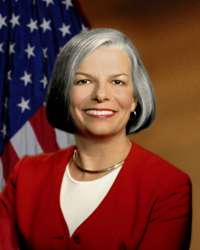Julie Gerberding

Julie Louise Gerberding, M.D., M.P.H. (born August 22, 1955), is an American infectious disease expert and the former director of the U.S. Centers for Disease Control and Prevention (CDC) and administrator of the Agency for Toxic Substances and Disease Registry (ATSDR).
Gerberding led CDC's efforts to prepare for and counter terrorism. She is an Associate Clinical Professor of Medicine (Infectious Diseases) at Emory University and an Associate Professor of Medicine (Infectious Diseases) at the University of California, San Francisco (UCSF).
Education and early career
Before becoming CDC Director and ATSDR Administrator, Gerberding was Acting Deputy Director of the National Center for Infectious Diseases (NCID), where she played a major role in leading CDC's response to the anthrax bioterrorism events of 2001. She joined CDC in 1998 as Director of the Division of Healthcare Quality Promotion, NCID, where she developed CDC's patient safety initiatives and other programs to prevent infections, antimicrobial resistance, and medical errors in healthcare settings. Prior to coming to CDC, Gerberding was a faculty member at the University of California at San Francisco (UCSF) and directed the Prevention Epicenter, a multidisciplinary research, training, and clinical service program that focused on preventing infections in patients and their healthcare providers. Gerberding is a Clinical Professor of Medicine (Infectious Diseases) at Emory University and an Associate Professor of Medicine (Infectious Diseases) at UCSF.
She earned a B.A. magna cum laude in chemistry and biology and a M.D. at Case Western Reserve University in Cleveland, Ohio. Gerberding then completed her internship and residency in internal medicine at UCSF, where she also served as Chief Medical Resident before completing her fellowship in Clinical Pharmacology and Infectious Diseases at UCSF. She earned an M.P.H. degree at the University of California, Berkeley in 1990.
Gerberding is a member of Phi Beta Kappa, Alpha Omega Alpha (medical honor society), American Society for Clinical Investigation (ASCI), American College of Physicians, Infectious Diseases Society of America, the American Epidemiology Society, the National Academy of Public Administration, and the Institute of Medicine.
CDC tenure

In 1998, Gerberding joined the CDC as director of the Division of Healthcare Quality Promotion for the National Center for Infectious Diseases (NCID), where she developed the CDC’s patient safety initiatives and other disease prevention programs. She rose to become the acting deputy director of NCID and helped lead the CDC’s response to the anthrax bioterrorism events of 2001.
Restructuring
Soon after her arrival at the CDC, Gerberding began an overhaul of the agency's organizational structure. On April 21, 2005 Gerberding formally announced the reorganization of CDC to "confront the challenges of 21st-century health threats".[1] This reorganization resulted in the following structure:[2]
- Coordinating Center for Environmental Health and Injury Prevention (CCEHIP)
- National Center for Environmental Health (NCEH)
- Agency for Toxic Substances and Disease Registry (ATSDR)
- National Center for Injury Prevention and Control (NCIPC)
- Coordinating Center for Health Information Service (CCHIS)
- National Center for Health Marketing (NCHM)
- National Center for Health Statistics (NCHS)
- National Center for Public Health Informatics (NCPHI)
- Coordinating Center for Health Promotion (CCHP)
- National Center for Chronic Disease Prevention and Health Promotion (NCCDPHP)
- Coordinating Center for Infectious Diseases (CCID)
- National Center for Immunization and Respiratory Diseases (NCIRD)
- National Center for HIV/AIDS, Viral Hepatitis, STD, and TB Prevention (NCHHSTP)
- National Center for Zoonotic, Vector-Borne and Enteric Diseases (NCZVED)
- National Center for Preparedness, Detection and Control of Infectious Diseases (NCPDCID)
- Coordinating Office for Global Health (COGH)
- Coordinating Office for Terrorism Preparedness and Emergency Response (COTPER)
- Emergency Operations Center (EOC)
- National Institute for Occupational Safety and Health (NIOSH)
Resignation
The Obama Administration did not keep Gerberding and she resigned from her post on January 20, 2009.[3]
Professional background
Gerberding served as a member of CDC's National Center for Infectious Diseases´ Board of Scientific Counselors, the CDC HIV Advisory Committee, and the Scientific Program Committee, National Conference on Human Retroviruses. She has also been a consultant to the National Institutes of Health, the American Medical Association, CDC, the Occupational Safety and Health Administration, the National AIDS Commission, the Congressional Office of Technology Assessment, and the World Health Organization. Gerberding currently serves on the Board of Directors for Accordia Global Health Foundation.[4]
Gerberding's editorial activities have included appointment to the Editorial Board of the Annals of Internal Medicine; appointment as an Associate Editor of the American Journal of Medicine; and service as a peer-reviewer for numerous internal medicine, infectious diseases, and epidemiology journals. Her scientific interests encompass patient safety and prevention of infections and antimicrobial resistance among patients and their healthcare providers. She has authored or co-authored more than 140 peer-reviewed publications and textbook chapters and contributed to numerous guidelines and policies relevant to HIV prevention, post-exposure prophylaxis, management of infected healthcare personnel, and healthcare-associated infection prevention.
In 2005, she was named one of Time magazine Top 100 Innovators of the Year for her leadership in modernizing the $9 billion agency as it faced unprecedented challenges, including new and emerging infectious diseases and bioterrorism. In 2006, Dr. Gerberding gave the commencement speech at the Harvard School of Public Health. Forbes magazine listed her 32nd among The World's 100 Most Powerful Women in 2007 [5] and 24th in 2008.[6] In addition to serving as a delegate in the World Economic Forum, Gerberding recently received the Surgeon General’s Medallion for actions of exceptional achievement to the cause of public health and medicine. For her contributions to the health field,Accordia Global Health Foundation honored Dr. Gerberding with the Global Health Leadership Award in 2008.[7]
In late 2009, Gerberding became president of Merck's vaccines division.[8]
Julie L. Gerberding sold 38,368 shares of her Merck stock on the open market in a transaction dated Friday, May 8th. The stock was sold at an average price of $60.99, for a total transaction of $2,340,064.32. Following the sale, the executive vice president now directly owns 31,985 shares of the company’s stock, currently valued at approximately $1,950,765.15.[9][10]
References
- ↑ "CDC Office of Director, The Futures Initiative". CDC - National Center for Disease Control and Prevention. Retrieved 2008-12-28.
- ↑ "Management Analysis and Services Office". CDC - National Center for Disease Control and Prevention. Retrieved 2008-12-28.
- ↑ "CDC director resigns effective January 20 - CNN.com". CNN. January 9, 2009. Retrieved May 7, 2010.
- ↑ "Welcome!!". Accordiafoundation.org. Retrieved 2016-01-31.
- ↑ "The World's 100 Most Powerful Women". Forbes. Retrieved 2016-01-31.
- ↑ "The 100 Most Powerful Women sorted by Rank". Forbes. Retrieved 2016-01-31.
- ↑ Archived December 5, 2009, at the Wayback Machine.
- ↑ "Julie Gerberding, Merck Vaccines". FierceBiotech.com. 2013-11-26. Retrieved 2016-01-31.
- ↑ Archived May 28, 2015, at the Wayback Machine.
- ↑ "SEC FORM 4". Sec.gov. Retrieved 2016-01-31.
External links
- CDC.gov - 'Biography for CDC Director Dr. Julie Louise Gerberding, MD, MPH, Centers for Disease Control
- HHS.gov - 'Julie Gerberding, MD, MPH, Named CDC director and ATSDR administrator' (press release), U.S. Department of Health and Human Services
- MedScape.com - "Interview With Julie L. Gerberding, MD, MPH, Director, Centers for Disease Control and Prevention from Biosecurity and Bioterrorism: Biodefense Strategy, Practice, and Science", Madeline Drexler, WebMD (May 1, 2003)